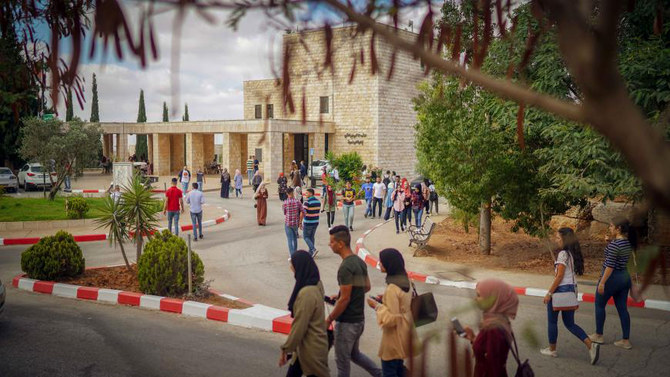RAMALLAH, WEST BANK: Mohammed Khweis, 21, was enjoying his studies and looking forward to completing his course at Birzeit University’s College of Business Administration, near Ramallah in the occupied West Bank.
Now the third-year student from East Jerusalem has a very different outlook following sit-ins and violent protests by representatives of student blocs that have disrupted classes and forced the university to close at least once.
The protests have left students unable to complete their coursework and the academic future of 15,000 pupils hanging in the balance.
Khweis was used to traveling almost 40 km daily to the university and returning home at the end of the day — but now spends his days sleeping and nights playing cards with friends.
“I am bored and worried that this situation will continue,” he told Arab News.
Even in these circumstances, Khweis is not in a position to look for temporary work because he cannot predict when the university will reopen and students will be able to resume their studies.
The crisis escalated when the university administration — concerned that protest activities could be used as an excuse by Israeli armed forces to invade the institution — prevented Hamas and Popular Front for the Liberation of Palestine representatives from displaying cartoon rockets on campus during a march to celebrate the anniversaries of their political parties on Dec. 13-14.
However, politically affiliated students rejected the decision and accused the administration of imposing restrictions on freedom of political expression on the campus.
The dispute led to a temporary closure of the university, with students and academic staff prevented from entering the facility.
In the wake of the row, student activists are demanding that the university administration fire the vice president and the acting dean of students’ affairs.
Ghassan Al-Khatib, the university’s vice president, told Arab News on Friday that people are worried about their children’s academic future.
“Students have the right to sit and strike, practice freedom of expression and hold elections, but not through methods that have a high price,” Al-Khatib said.
“It is unreasonable to disrupt the educational process and mortgage the interests of 15,000 students to demands that can be achieved by other means without causing losses, such as closing the university,” he added.
“Academic and cultural institutions are not the place for military parades.”
Despite prominent Palestinian civil society institutions attempting to mediate between the university administration and student representatives, the students insist their demands be met.
Nader Oweidat, 23, a political science and international relations student, and the coordinator of the Islamic bloc at Birzeit University, claimed that “we do not like to close the university.”
But he told Arab News that the university administration had appointed an acting dean of student affairs “who took advantage of her position in an attempt to domesticate the student movement at the university.”
He added: “This is unacceptable, so we have clear demands for her dismissal.”
Oweidat said that Birzeit University enjoys unparalleled freedoms in comparison with other Palestinian universities, “and we want to preserve that democratic and pluralistic atmosphere.”
With the dispute threatening the academic year of 15,000 students, families have begun to voice their frustration with student representatives’ “irresponsible position.”
Mahmoud Khweis, father of university student Mohammed, told Arab News: “I do not trust the students’ ability and their future vision to maintain Birzeit University’s scientific position in Palestine and the world. We should not allow them to be responsible for the future of the university.”
The general rights of students are more important than the individual rights of a small group, he said.
Khweis said that the Palestinian police should reopen the university’s doors, and allow both students and teachers to resume the educational process.
The role of student activists should be limited to helping students reduce educational fees and solving their academic problems, and not engaging in political work on campus, he said.
The Birzeit University campus is the only West Bank arena left for the Hamas movement to stage its political activities freely.
However, Owaidat said: “While the university administration tolerated Fatah activists in the university organizing a military parade with real weapons, it was annoyed by the presentation of the Qutub (PFLP) and the Islamic bloc (Hamas) with cartoon models of rockets.”
The Palestinian Authority asked Higher Education and Scientific Research Minister Mahmoud Abu Muwais on Jan. 31 to communicate with the university administration and student representatives in a bid to solve the dispute.
However, some believe that the government’s influence is minimal since Birzeit University is a private entity, unlike other Palestinian universities.
Birzeit University was established in 1972 as a private institution. It has become one of the oldest Palestinian universities, and is characterized by a liberal atmosphere and policies that allow freedom for various student activities.
Many prominent Palestinian leaders have graduated from the university, including Prime Minister Mohammed Shtayyeh.
The university awards a bachelor’s degree in dozens of subjects, a second degree in 35 subjects, and a third doctorate in two subjects. It also maintains academic relations with many prestigious universities in Europe and the US.
“We get used to seeing the Israeli occupation closing the university and not its students,” Khweis said.
“We should raise our voices in the face of those students from a young generation and tell them what they are doing is wrong.”















